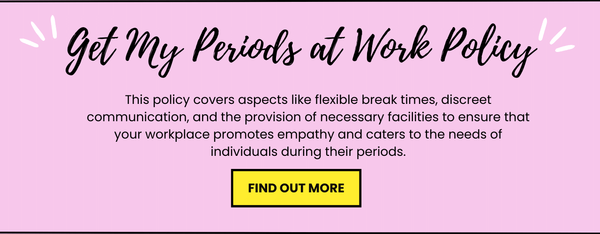Why You Need a Periods at Work Policy

When it comes to the modern workplace, talking about topics that were previously taboo are becoming more popular.
And in line with this, many organisations are starting to add more modern HR policies into their organisation - such as Menopause Policy, Neurodiversity Policy, Pets at Work Policy etc.
Today’s focus is on other increasingly popular HR Policy - which is Periods at Work (also called Menstruation Policy).
I’ll cover what it is, and why you might need one. Plus, you can grab my Periods at Work Policy template, to save time and avoid needing to create one from scratch.
Making Taboo Mainstream
Although periods are a normal part of women’s life, the traditional British culture meant employers didn’t acknowledge this. I mean, it’s not really something that anyone feels comfortable discussing with their manager. But this is changing and employees are expecting their employers to support them more holistically with wellbeing at work. 🧘♀️
The driver stems from employee wellbeing becoming one of the top priorities for many organisations over the last few years. The shift really started with organisations putting more emphasis on employee wellbeing, following the pandemic.
And from there, other formally ‘taboo’ topics have become hot topics within the HR community, and periods has been one of them. You’ll see there’s a lot more about periods at work in talked about in the press, and through employee wellbeing communities.
The rise of the Periods at Work Policy
You may know that HR Professionals love a Policy (as long as it has purpose).
A policy is all about establishing the rules within the organisation, which allows for clarity, consistency, fairness and legal compliance.
A Periods at Work Policy is a strategic move to boost employee well-being, offer dignity and reduce embarrassment. By creating an open and empathetic dialogue, this policy aims to destigmatise menstruation and provide practical solutions to support individuals during their menstrual cycles. It can increase employee attendance and legitimise absence where this is needed.
Employers can improve employee experience by creating environments and work cultures that are menstruation-friendly, and by providing support for menstrual health conditions that is underpinned by the principles of compassion, empathy and inclusivity. 💗
The Business Case for having a Periods at Work Policy
Let's talk numbers – in the UK, half of the population experiences menstruation.
According to a recent survey, over 80% of women in the UK reported that their work had been affected by menstrual symptoms, with PMS symptoms (impacting moods and emotions) affecting around 75% and 20% of people taking sick leave. This not only impacts individual well-being but also affects overall workplace productivity. 😔
The CIPD research found that more than two-thirds of women experience a negative impact at work due to menstruation symptoms and more than half (53%) had been unable to go into work at some point due to their symptoms. For a small minority (4%) this was the case every month.
Therefore, having a simple policy can help to make adjustments to support employees and get the best out of them and brings the following benefits.
- Enhanced Productivity: By acknowledging and supporting employees during their menstrual cycles, you create a workplace where individuals feel valued and understood. This can lead to increased morale, job satisfaction, and, ultimately, higher productivity.
- Reduced Absenteeism: Offering flexibility and support can significantly reduce absenteeism related to menstrual symptoms. When employees feel comfortable managing their health needs at work, they are more likely to show up consistently.
- Talent Retention: A Periods at Work Policy signals to employees that your company prioritises inclusivity and cares about their well-being. This can contribute to higher employee retention rates and a positive company culture.
- Enhanced Reputation: In an era where corporate social responsibility is a significant factor in brand perception, implementing progressive policies like this one can enhance your company's reputation as a socially conscious and employee-centric organisation.
What a Period at Work Policy Covers
Now, you might be wondering – what does a Periods at Work Policy actually include?
Well, it's not a one-size-fits-all solution; rather, it's a flexible framework that can be tailored to meet the unique needs of your workforce. Some key elements to consider include:
- Flexible Working Arrangements: Recognising that menstrual symptoms can vary in intensity, providing flexibility in working hours or remote working options can empower employees to manage their workloads more effectively.
- Access to Menstrual Products: Stocking restrooms with a variety of menstrual products, free of charge, is a simple yet impactful way to support employees. This ensures that no one is caught off guard and struggling to find necessary supplies.
- Awareness Programs: Educating employees about menstrual health and creating an open dialogue can contribute to breaking the stigma surrounding menstruation. Workshops, webinars, or informative materials can be integrated into your company's wellness initiatives.
- Wellness Support: Offering wellness programs that specifically address the physical and emotional aspects of menstruation can foster a healthier workplace. This could include access to mental health resources, yoga or meditation sessions, and health and well-being apps.
How to Implement a Periods at Work Policy
Implementing a Periods at Work Policy requires a thoughtful and inclusive approach. Start by conducting a workplace assessment to understand the specific needs of your employees. Engage with your workforce through surveys or focus groups to gather insights and ensure that the policy is tailored to meet their requirements.
Next, collaborate with relevant stakeholders, including HR, management, and employee representatives, to draft a policy that aligns with your company's values and goals. It's essential to communicate the policy transparently and ensure that employees are aware of the support available to them.
Regularly evaluate the effectiveness of the policy through feedback mechanisms and make necessary adjustments to address emerging needs. A dynamic and responsive Periods at Work Policy is key to fostering an environment where employees feel supported throughout their menstrual cycles.
Introducing Our Periods at Work Policy Template
To make the process of implementing a Periods at Work Policy even more seamless for your organisation, we've crafted a comprehensive template that can be tailored to your specific needs.
In conclusion, embracing a Periods at Work Policy is not just a progressive move; it's a human-centric approach that acknowledges and supports the diverse needs of your workforce.
By breaking the taboo surrounding menstruation and fostering an inclusive environment, you're not just creating a better workplace; you're contributing to a broader cultural shift towards understanding, empathy, and equality. 🌈
Together, let's make every workplace a place where everyone feels empowered, supported, and free to be themselves – no matter the time of the month. 🌸
Extra Resources
You might find it helpful to include information on or signpost to some of the following sources of information and advice:
- NHS information on periods
- NHS endometriosis information
- NHS adenomyosis information
- NHS polycystic ovary syndrome (PCOS) information
- Menstrual Matters, for information and trackers
- BUPA: Painful periods information
- Endometriosis UK
- Active Iron's Endometriosis in-depth guide
- Verity: Support for PCOS
- PCOS Awareness Association
- Mind premenstrual dysphoric disorder (PMDD) information







